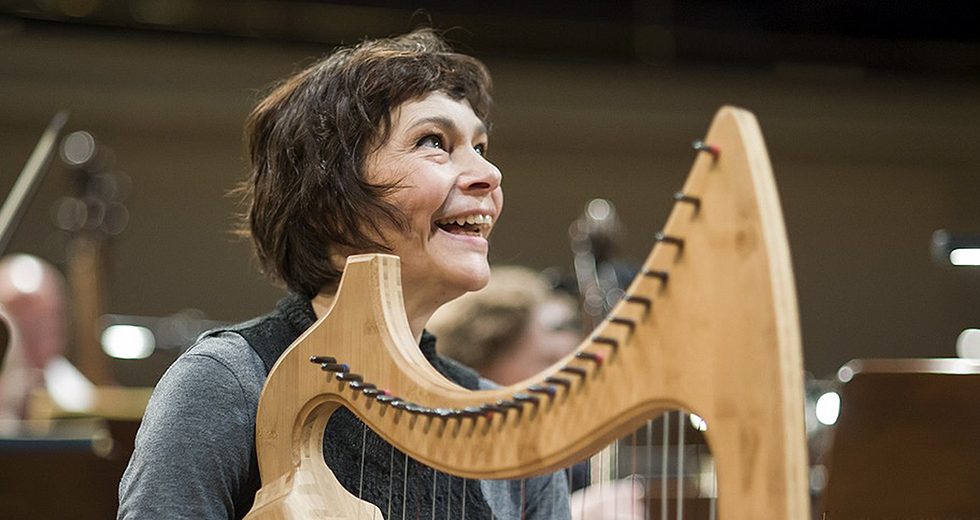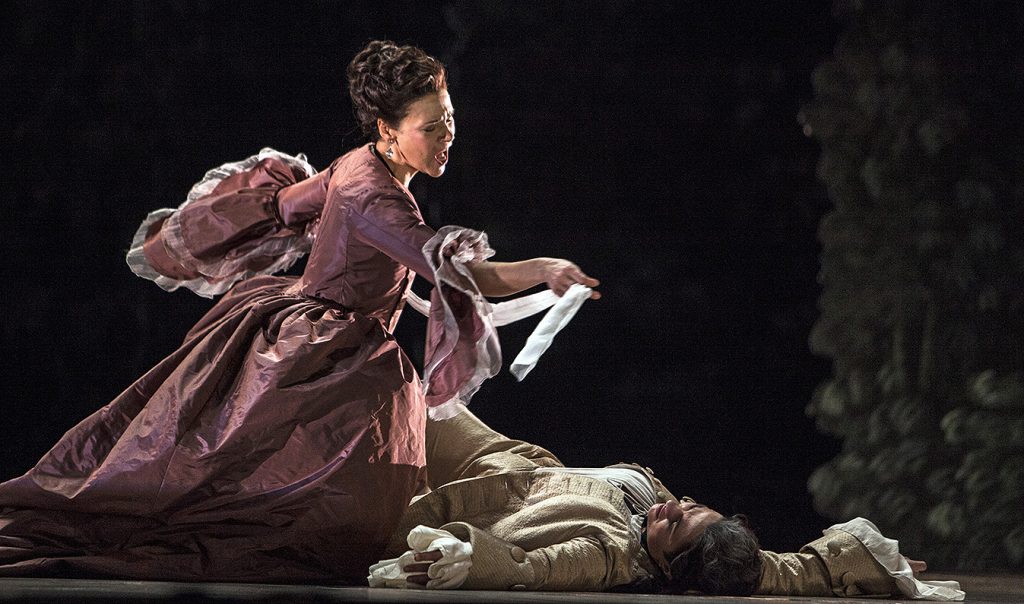
When French soprano Sandrine Piau was little, she fell in love with the harp after watching the animated movie “The Aristocats,” or “Les Aristochats,” as it is known in France. She was captivated by the rollicking musical number “Ev’rybody Wants to Be a Cat,” in which Duchess, one of the lead characters, joins in the merriment with a solo on a weather-beaten harp that happens to be in the attic where the cats are.
After studying the harp for much of her youth, Piau attended the prestigious Conservatoire National Supérieur de Musique du Paris with the intention of pursuing a career on the instrument. But then she heard of a Baroque-interpretation voice program led by American-born French conductor William Christie; she decided to enroll because she wanted to know more about what seemed at the time like a “strange world.” She had participated in choirs growing up and enjoyed singing, so she was able to pass the required audition. “It was not for real singers,” she said. “It was to study the style of Baroque music, especially French.”
But it didn’t take long for her voice studies to supplant harp instruction. Since then, Piau has gone on to become one of France’s best-known and most-recorded classical artists. If she does not have the renown of some other major vocalists, it is because she devoted herself to the Baroque repertoire and only occasionally ventures into later works such as Mozart’s Così fan tutte or Poulenc’s The Dialogue of the Carmelites. Furthermore, her visits to the United States are sporadic — sometimes two times a year, but in some years, none at all.

Sandrine Piau sings the title role in Handel’s Alcina at the Théâtre Royal de la Monnaie in Brussels. She appears Oct. 5-7 in a program of French choral works with the Chicago Symphony Orchestra. | Photo: Bernd Uhlrig
In February, under the auspices of the University of Chicago Presents, she made her long-overdue Chicago recital debut with a program of French and German songs titled Après un Rêve. This fall, she will make her first appearances with the Chicago Symphony Orchestra in a program Oct. 5-7 that includes two French choral masterworks: Francis Poulenc’s Gloria and Charles Gounod’s St. Cecilia Mass.
On the podium will be a French maestro Piau knows well: Alain Altinoglu, music director of the famed Théâtre Royal de la Monnaie in Brussels. “He is an amazing conductor, and is really so good, especially in French music,” she said in a phone interview from the Salzburg Festival, where she was appearing in production of Handel’s Ariodante. “So I’m really happy to be with him and with this orchestra in Chicago for these three concerts.”
At first, Piau’s participation in Christie’s Baroque program had been just a kind of lark — what she described as something “just for fun.” But at the end of her time at the conservatory, Christie invited her to give up the harp and perform with him as a singer. “He just told me: ‘Trust me, you will be a singer. You can do this.’ ”
She acknowledges being reluctant at first, because it was such a big step. But Christie was not just any conductor. As the founder of Les Arts Florissants, one of the most admired Baroque period-instrument ensembles in the world, he has gained international acclaim both for his intrepid discoveries of forgotten masterpieces and his reputation for unfailing excellence.
For about 10 years or so, beginning in 1989, Piau worked closely with Christie and Les Arts Florissants, appearing on many of their recordings, including Handel’s Messiah (1994) and Henry Purcell’s King Arthur (1995). “It was very exciting,” she said. Then, she decided it was time to move on and work with other conductors. She went on to collaborate with other notable Baroque specialists such as Philippe Herreweghe, Ton Koopman and Christophe Rousset. “There is no choice,” she said. “I think you have to open your eyes, and go in a different direction and meet other people with other musical ideas.”
Piau typically appears in one or two opera productions a year, many of them at the Festival d’Aix en Provence, because it is not far from her residence in Marseilles. That proximity allows her to return home each night after rehearsals and performances. “I love opera, and when the production is beautiful, it’s amazing, because you have theater and music together and nothing can be more exciting,” she said. But she doesn’t like to commit to more productions, because the multi-week commitments for rehearsals and performances keep her away from her family. There’s also the risk of being stuck in staging she disdains. “Sometimes, it’s eight weeks, and it’s just a nightmare,” she said. “You know that from the very first day.”
At the same time, she wants to have ample time in her schedule for concerts, both recitals and orchestral programs like the ones she is doing in Chicago. With Piau, balance is the key. “If I could just sing theater, I would be very unhappy,” she said. “And if I had to sing just concerts, I would be unhappy, too.”
Along the way, she has become one of world’s most respected singers, especially in the Baroque realm. She regularly receives reviews like this one from New York Times music critic Zachary Woolfe after a 2012 recital in Zankel Hall with pianist Susan Manoff: “Hearing Ms. Piau’s voice is like stroking a cat: you sense a firm structure underlying its soft-grained smoothness. It is a voice born to float slowly — at fast tempos it gets less traction, high notes have an edge, and low ones disappear.”
TOP: Trained as a harpist, French soprano Sandrine Piau occasionally doubles on the instrument, as she did for a recent concert with the Baroque orchestra Collegium 1704. | Photo: Petra Hajská/ Collegium 1704